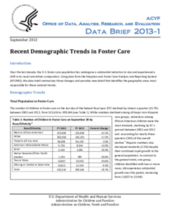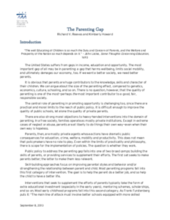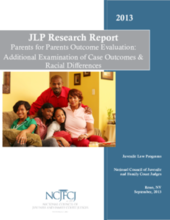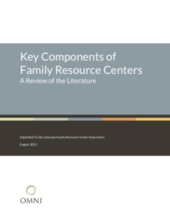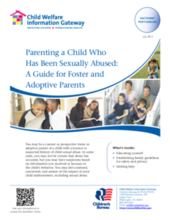Displaying 2361 - 2370 of 2509
While adoptions to the United States are in steep decline, more U.S. children are being adopted abroad in countries such as the Netherlands. Most of the U.S.
This Washington Post article discusses the findings from a major report by the National Academy of Science on child abuse and neglect that found that advances in brain research showed that child abuse and neglect damages not only the way a developing child’s brain functions, but changes the actual structure of the brain itself.
Over the last decade, the U.S. foster care population has undergone a substantial reduction in size and experienced a shift in its racial and ethnic composition. Using data from the Adoption and Foster Care Analysis and Reporting System (AFCARS), this data brief summarizes those changes and provides new detail that identifies the geographic areas most responsible for these national trends.
This chart produced by the US Government's Children's Bureau includes data submitted to the Adoption and Foster Care Analysis and Reporting System (AFCARS) by US States, the District of Columbia and Puerto Rico by July 19, 2013.
This series of articles by Reuters investigates the disturbing practice of 'private re-homing' of adopted children in the USA, particularly affecting children adopted from overseas. 'Re-homing' also called 'adoption disruption' refers to adoptive parents abandoning their children and handing them out to other adults, often found through internet and social media fora, without any type of formal vetting or procedures.
This paper by the Brookings Center on Children and Families examines the scope of parenting interventions in the US that directly address poor parenting, as research has found how much parenting matters.
This evaluation sought to explore the differences in case outcomes by program participation and racial groups.
The well known radio show This American Life has collaborated with Planet Money to investigate the work of a charity called GiveDirectly. Instead of funding schools or wells or livestock, GiveDirectly has decided to just give money directly to the poor people who need it, and let them decide how to spend it.
This report reviews the literature on Family Resource Centers in the United States.
This factsheet is designed for caregivers and discusses how they can help children in their care by educating themselves about child sexual abuse, establishing guidelines for safety and privacy in their families, and understanding when and how to seek help if needed.

